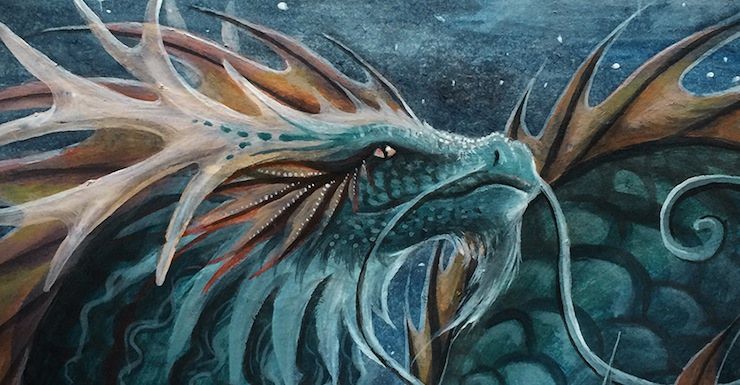Before I get into the meat of this week’s column (four novellas!), I want to extend my thanks for the thoughtful and constructive comments on last week’s column. Well done for those, dear readers! You (some of you) restore my faith in human nature.
This week, I thought I’d have a fine and uncontroversial blog post about a wee selection of novellas: Foz Meadows’ “Coral Bones,” from the anthology Monstrous Little Voices (out of Abaddon Books); Beth Bernobich’s The Ghost Dragon’s Daughter (self-published); Fran Wilde’s The Jewel and Her Lapidary (Tor.com Publishing, forthcoming); and Heather Rose Jones’s The Mazarinette and the Musketeer (self-published). Believe me when I say I didn’t set out to read four novellas in a row in which queer and female relationships, both romantic and not, prove the main factor shared between them: it happened entirely by accident. I’m not exactly unhappy with this turn of events. It’s just always a bit startling when it happens.
“Coral Bones” is, I think, the longest of these—it might tie with The Jewel and Her Lapidary—and for me, the strongest. Its strength is in part in its dialogue with Shakespeare’s The Tempest, and the world and the characters whose stories we know beyond the confines of the page. “Coral Bones” builds on that background, in the story of a Miranda who cannot fit into Ferdinand’s court: a Miranda who finds the role she’s required to play a prison. A Miranda who is genderqueer, and who looks to find her happy ending elsewhere:
I wish—I wish—I could change as Ariel does, that flicker-flash between girl and man; I wish my form could be all the forms my heart desires! The moon has phases, does it not? We call it full and half and harvest, but through its wax and wane, it remains the moon, and we love it no less—must I be any different?
It’s a story about power and selfhood, independence and personhood: compact and eloquent all at once. It’s powerful, and if the rest of the novellas in Monstrous Little Voices are half this good, I look forward to reading them immensely.
The Jewel and Her Lapidary, by Fran Wilde, is another story about power. Although this one’s about loss, friendship, and responsibility. Two young women, one magically bound to protect and obey the other, are the last survivors of the ruling class of a kingdom defended up to now by magic. Captives of an invader, they alone must keep the magic of the gems out of enemy hands. It’s a novella about love and duty, at its heart: elegant and affecting.
Beth Bernobich’s The Ghost Dragon’s Daughter is a story about friendship and education, set in a world where magic and technology mix: three friends working on a graduation project, dreaming of making it out to bigger and better things. It’s a surprisingly sweet story, all things considered—despite financial stresses and things like watch demons roaming the streets at night, that eat you if you don’t have a magic medallion. Sweet and light and touching.
Last—but not least—is Heather Rose Jones’ The Mazarinette and the Musketeer. Which is a novella featuring Hortense Mancini (who disguised herself as a man to escape her terrible marriage, famously fought duels, and ended up a lover of Charles II—and involved, probably romantically, with the daughter of one of Charles’ former favourites), Aphra Behn, playwright and spy, and Julie d’Aubigny, who is a woman you could not make up if you tried. This is technically more in the line of a historical caper than science fiction or fantasy, but who doesn’t love a caper involving dressing as Musketeers, extricating a woman from a convent, and making off with Important State Papers?
They are good novellas. You should try them.
Top image from the cover to The Ghost Dragon’s Daughter. Art by Saraais.
Liz Bourke is a cranky person who reads books. She has recently completed a doctoral dissertation in Classics at Trinity College, Dublin. Find her at her blog. Or her Twitter.










